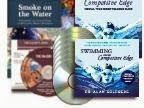BY DR. ALAN GOLDBERG//COMPETITIVEDGE.COM
How you interact with your parents in relation to your swimming can mean the difference between loving to swim, staying calm pre-meet and consistently racing to your potential or hating the sport, being a nervous wreck pre-meet and consistently underachieving.
WHAT YOU NEED TO KNOW ABOUT YOUR PARENTS
Loving parents want two things for you as their child:
- To be HAPPY
- To be SUCCESSFUL
But, have you ever had that really upsetting conversation with your parents during the car ride on the way to the meet? Or maybe the even more uncomfortable one right after the meet, on the ride home?
You know what I mean. Before the meet, mom or dad might remind you what you have to do to swim fast, the times you need to get and/or who you really should be beating. And then on the way home, you're asked a lot of questions about your swim, and they want to talk about what might have happened when you didn't perform as well as you hoped. And then you feel defensive when you hear their suggestions about what you could've done better. For most swimmers, these kinds of “chats” leave them feeling sad, angry and misunderstood.
Regardless of how these conversations leave you feeling, your parents are really trying to help. They want you to love your sport, succeed in it and have fun in the process. We can say that their heart is in the right place. However, what a lot of parents don't really understand is HOW to go about doing this. So when they give you pre-meet advice and/or after-race critiquing, their intention is to be positive and helpful. Unfortunately, the normal end result of this kind of “help” leaves you feeling criticized and angry.
A PARENT'S ROLE ON THE “TEAM”
Your parents have a very important role to play on the swimmer-parent-coach team in order for you to have a successful and fulfilling experience in the pool. If they play their proper role to the best of their ability, it will increase the chances that you will continue to love your sport and go as far as possible in it. If, however, they don't stick to their ”job,” and instead, try to take on the role of the coach, then they will inadvertently diminish your love of swimming and therefore, hurt your chances of reaching your goals.
A parent's job on “the team” is to BE SUPPORTIVE, UNCONDITIONALLY LOVING and, equally as important, NOT to COACH.
Pre-race advice, attempts to motivate you to work harder at practice, and after-meet analysis/criticism that constitute coaching, are NOT the job of a parent and will almost always end up stressing you out and hurting your meet performance.
HOW TO GET YOUR PARENTS TO REALLY HELP
What your parents most need from you is proper “coaching” as to what YOU would find most helpful in relation to your swimming, because what they think is helpful and what you need from them may often be two, very different things. What this means is that you need to have “THE” conversation with them where you very clearly help mom and dad understand what works and what doesn't work for you. Please understand that you will NOT be hurting your parents' feelings by doing this. You will NOT be criticizing them. This is NOT being disrespectful as long as you do it calmly and in a spirit of “I need your help! Here's what I'd like you to do, which would really make things easier for me!” When you do this, you'll be helping them, to be most helpful to you.
I understand that having this kind of very direct conversation with your parents may be far too intimidating. So, if you feel that it is too hard to talk with your parents about this topic, then please ask them to read this article.
USING THE “STOP, START, CONTINUE” TECHNIQUE
The very best and conflict-free way I know to have this conversation with your parents is by sitting down with them in a spirit of mutual cooperation and using the STOP, START, CONTINUE technique. There are three steps to it:
“What behaviors/comments do you want your parents to STOP that they are currently doing, which leave you feeling overly nervous, upset, angry and or defensive?”
For example, many parents may want to remind their son/daughter on the way to the meet about all the things that the swimmer needs to remember in order to swim fast. Rather than this being helpful, swimmers usually end up feeling more nervous by these last-minute reminders. This would be a behavior that you as the athlete want stopped. Or after the race, when you're really disappointed with your result, the very last thing you want to have to do is listen to all the feedback your parents have about your swims. This after-race critiquing would be another behavior you would like stopped. Finally, some parents may periodically remind a swimmer how much time, energy and money they're investing in the sport as a way of trying to get you more motivated, and this only serves to put even more pressure on you to go fast at meets, leaving you feeling guilty when you don't. This would be another behavior you would want stopped.
“What behaviors/comments would you like your parents to START doing that you would find incredibly helpful and supportive?”
Remember, they really want to be helpful, and the more specific you can be here, the better. So maybe you would like them to allow you to listen to your music on the way to your meets and if you do talk with them, you want them to talk about things that have nothing to do with swimming and the upcoming meet. Or, after a disappointing race, you would like them to give you silent support and allow you to feel disappointed if you are, without having to discuss the race/meet. Or perhaps you'd like them to find the things that they think you did well and point those out.
“What behaviors/comments would you like them to CONTINUE that you have found really helpful/supportive to you in the past?
This would include all of things that your parents have been doing and saying in relation to your swimming that helped you feel calm and confident whenever you practice or compete. For example, if they make you feel that no matter how you swim, good or bad, this has absolutely no effect on how they treat you after the meet or practice, then you want them to continue that. Similarly, if they are there for you with a smile, your towel and a snack after the meet, you'd want them to continue that! If their goofy sense of humor or music cracks you up and relaxes you on the way to or from the meets, then you want them to certainly keep that going!
Keep in mind that having a long, rewarding experience in the pool takes a “team” effort. Start today to help your parents help you!
As a sports psychology consultant, Dr. Alan Goldberg works with swimmers at every level. A presenter at the Olympic Training Center, swim coaches clinics and clubs around the country, Dr. G specializes in helping swimmers struggling with performance problems, get unstuck and swim fast when it counts the most. He works over Skype, providing one-on-one consultation with swimmers and other athletes around the world. Dr. G has written over 35 mental toughness training programs and books. In addition, he is a regular contributor to Splash Magazine.
For more FREE mental toughness tips and swim articles, go to Dr. Goldberg's website, www.competitivedge.com and click on “choose your sport” and then “swimming.” You can also visit him on Facebook, follow him on Twitter and sign up for his free, monthly mental toughness newsletter.
Want to get a head start on your mental toughness training? Dr. Goldberg's BRAND NEW 7 CD Swim Program with track-by-track Training Guide now available! All products in his store at a 10% discount for USASwimming.org. readers. Coupon Code at check-out: USASwimming. FREE SHIPPING NOW AVAILABLE.
Questions? I hope you'll feel free to contact Dr. Goldberg at Goldberg@competitivedge.com or call directly (413) 549-1085.

 It’s hard work chasing our goals. Not only does it require investing a lot of effort, with countless hours in and out of the pool, but it also requires us to suspend our fears. The fear of failure, fear of success, fear of looking bad.
It’s hard work chasing our goals. Not only does it require investing a lot of effort, with countless hours in and out of the pool, but it also requires us to suspend our fears. The fear of failure, fear of success, fear of looking bad.  When I was a college swimmer, one of the hardest lessons to learn was not to fight the water.
When I was a college swimmer, one of the hardest lessons to learn was not to fight the water.